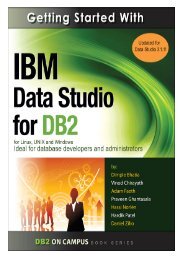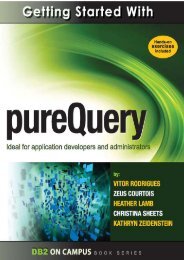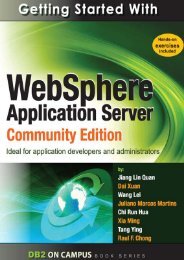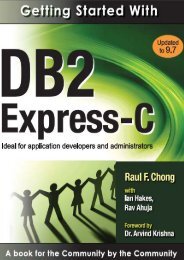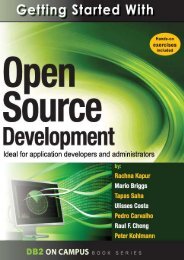Getting Started with Open Source Development
You also want an ePaper? Increase the reach of your titles
YUMPU automatically turns print PDFs into web optimized ePapers that Google loves.
Chapter 5 – Participating in open source development 69<br />
Now don’t get the wrong idea, it is not all dull work and necessity that makes an open<br />
source contributor. Some of us, specially the younger ones, have a tendency to get bored<br />
quickly. There’s a little noise bubbling in our heads, like kids on Christmas Eve that just<br />
have a lot of curiosity. We go to where our current obsession drives us.<br />
Finding an open source community that fits you out of pure interest should not be difficult,<br />
you see communities come in all size and shapes. They range from extremely large like<br />
the Linux kernel to the very small like your run for the mill script that downloads dubious<br />
content from the Internet. Some of the larger projects turn into non-profit organizations to<br />
provide a sustainable platform from where they can grow. This is why the Mozilla<br />
Foundation was born. You may know Mozilla as the organization who brings you Firefox, a<br />
really good Web browser that happens to be licensed as free and open source software.<br />
These larger projects function very much like a typical company, structured into different<br />
departments, each <strong>with</strong> an individual area of operation.<br />
Did you know?<br />
In 1993 a company called Netscape released a version of a graphical Web browser named<br />
Mosaic. Mosaic was one of the first of its kind, revolutionary as a matter of fact, quickly<br />
becoming the world's most popular browser. In 1995 Microsoft launched Internet Explorer,<br />
becoming the first Mosaic opponent. Internet Explorer was bundled <strong>with</strong> Windows, which<br />
gave it quite an advantage. By the end of the 90’s Netscape was already in trouble. In<br />
order to save the company Netscape leadership created the Mozilla Foundation, and<br />
released their browser as open source. They expected that by releasing the code, a<br />
community would gather around it, helping the company regain the lost market. They were<br />
right!<br />
Once you indentify a potential community <strong>with</strong> whom you’d like to get involved, you should<br />
take some time probing it. Try to figure how a new member’s work is contributed. Many<br />
projects will make available information on the subject but many others will not. If not in a<br />
separate section on their webpage, search forums for instructions on how to get your<br />
patches or bugs submitted. Go for frequently asked questions (FAQ) sections and wikis.<br />
Sometimes smaller projects include this information into text files that come <strong>with</strong> the source<br />
of the application, check it also! Ultimately if nothing else works search around the Web,<br />
maybe one of the community members has posted some information somewhere. A good<br />
example of a development guide is at http://ldn.linuxfoundation.org/how-participate-linuxcommunity<br />
a Linux kernel developer's guide, which makes also a good read even if you<br />
don’t plan to take on kernel development.<br />
Suffice is to say that open source has grown from being associated <strong>with</strong> a software project,<br />
to a more extended concept. <strong>Open</strong> source is now in effect a culture; it symbolizes free<br />
sharing of content. Communities gather around the most different concepts of content,<br />
written content, video, even hardware such as computer chips or cars are turned into open<br />
source.




